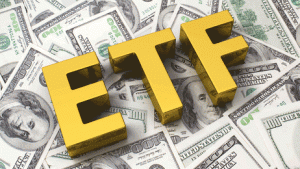The Benefits And Downfalls Of Exchange Traded Funds (ETFs)
 There are a plethora of investment vehicles available at your disposal today. Stocks, bonds, commodities, even crypto-currencies (yuck), could make up the bulk of your portfolio depending on your style.
There are a plethora of investment vehicles available at your disposal today. Stocks, bonds, commodities, even crypto-currencies (yuck), could make up the bulk of your portfolio depending on your style.
What you invest in often and should have a direct correlation to your financial risk tolerance. A younger, more aggressive investor looking to exponentially build their portfolio in earlier years may focus strictly on growth stocks. When the growth investor gets older, he may join the ranks of potential retirees and move his growth portfolio into a more passive, blue-chip dividend income style portfolio.
No style is wrong, and there is something out there for everyone. Whether you are a high volatility trader, a stingy penny pincher, or just looking for the next diamond in the rough, you’ll be sure to find your niche in the markets.
I’m going to explain an investment strategy that can be used by a beginner, someone who just doesn’t have time to go out stock hunting, or simply doesn’t feel like putting in the effort of grueling individual stock analysis.
Introducing the Exchange Traded Fund
Exchange Traded Funds (ETFs) are an incredibly wonderful thing, and they have absolutely exploded in the last couple of years. Why? There are a couple of reasons. We all know cash is king, that’s probably why you are reading a personal finance blog right now. You’re looking to save money where possible, and earn as much as possible. ETFs combine both of these goals into one amazing little package, at a fraction of the cost your financial advisor or bank is charging you right now to manage your money.
An ETF is a basket of securities so to speak. When you buy shares of AT&T, you’re getting a chunk of every sale that they make. However, when you buy an iShares U.S. Telecommunications ETF, your getting a chunk of, albeit smaller, AT&T, Verizon, T-Mobile, and Sprint’s sales.
Why is this beneficial to a new investor, or someone who simply doesn’t have the time to go navigating individual year-end-reports and sift through balance sheets? Let’s go over what makes ETFs such a good choice for the large majority of investors today.
The Benefits of ETFs
1. ETFs are Low-Cost
It is now public knowledge that banks and fund advisors are charging an absolute fortune to manage your money. The average MER, or management expense ratio charged by a mutual fund is 2.35%, according to Advisor.ca. On the other hand, the average MER of an ETF is 0.44%.
Now, to someone who doesn’t have much money in an investment account these fees may seem somewhat insignificant. But to an investor who has a $100,000 investment portfolio, you can image how quickly fees of $2350 dollars can add up over the years. Every dollar you save on management fees is able to compound in your account, be re-invested in stocks or some other investment vehicle, and return to you capital appreciation or dividends. This adds substantially up over time, and you’ll give yourself a gigantic pat on the back when you are ready to quit the 9-to-5 at 65, or maybe even 55, heck maybe you want to be semi-retired at 45! All just depends on the individual and their goals. But whatever the case may be compounded savings is huge, which directly involves close attention to management fees.
Why are the fees so much cheaper? It comes down to active management. When you are invested in a mutual fund, there is a team of analysts that are working around the clock to constantly balance and hopefully improve the portfolio. These people need to get paid, and it comes directly from your pocket. The passive ETFs is not managed by a fund manager, so the cost of doing business is generally lower.
2. ETFs Trade Like Stocks
ETFs, although structured similarly to a mutual fund, trade exactly like stocks. An investor is able to simply go on their brokerage account and place an order to buy or sell an ETF. There is no back-end sales charges or penalties for early withdrawal like some funds. You simply decide when you want to buy, and when you want to sell. A couple clicks on your online brokerage account and it’s done.
3. ETFs are Great for Diversification
There are a ton of ETFs out there, 600+ to be exact. So lets just say if you want exposure to any sector or market in the world, more than likely there is going to be an ETF for it. And if there isn’t, you can probably bank on one being available in the very near future.
An individual stock-picker looking to gain some exposure to the Canadian Utilities sector may have a difficult decision in picking Emera or Hydro-One to go along with their blue-chip giant in Fortis. The investor who decides they don’t have the skill nor patience to make said decision may just decide to buy the iShares S&P/TSX Capped Utilities Index ETF and gain exposure to all three of these companies, plus many more.
In doing so, the ETF investor limits their gains in a way due to the fact they are spread out over the entire industry, but they don’t run the risk of choosing the wrong stock and watching the one they passed over accelerate.
4. Due to Robo-Advisors, ETFs are Easier Than Ever to Trade
If you don’t have the time or knowledge to pick individual stocks, you may look at investing in ETFs to save you the hassle. If you’re really strapped for time, there are these little things called robo-advisors, and they will make your life very easy, investment wise.
Robo-advisors are just that. They are simply robots that run your investment portfolio. More often than not, all it takes is a simple questionnaire about what you’d like to get out of your investments and the sophisticated program immediately gets to work investing and balancing your portfolio to the best of it’s ability. It eliminates all aspects of human emotion, which if you don’t know, is an absolute killer in the stock market.
If you’re looking to go down this path, I would highly suggest seeing Wealthsimple. They have already absolutely crushed the Canadian market, and are now steaming into the US. I don’t use Robo-advisors myself, purely based off the fact that I love security analysis and digging into a company’s financials to find that next gem. But, I have tinkered with the program and in fact even opened up an account for my most recent Wealthsimple review. After completing the questionnaire, I had my doubts about how the process itself would line my investment portfolio up to reflect the one I currently manage. But I can tell you right now it was almost bang on. I was amazed at how accurate it was, so much so that I debated switching. But then what would I do with all my spare time?
The Downfalls of ETFs
If you’ve never heard of ETFs before, or just didn’t know much about them, you are probably pretty excited. Unfortunately, nothing is perfect in this world and there are some stumbling blocks you may run across if you decide to dabble in ETFs.
Most of them are very specific to the investor, whether it is tax rules in their country or the amount of risk they are willing to take when purchasing ETFs. For this reason, I’m going to go over the one glaring problem with ETFs that a lot of investors seem to run into.
1. The MER is Cheaper, but You Pay Commissions
When you buy into a mutual fund, commissions are often bundled into your payment to the fund. With ETFs, you pay a substantially lower management fee, but you have to be careful how often you trade these funds. If you aren’t careful, you may find you are paying more in Electronic Communication Network (ECN) fees, and commission fees. Most brokerages allow you to purchase ETFs for free, but make sure you read their fine print about any back-end charges that are applied, and if the ETF you are looking to purchase is eligible for their freebie.
Ultimately, the brokerages make their money when you sell the ETF. In most cases, it is just the standard commission fee. If you are indecisive however, and driven to buying and selling these funds like they are going out of style, you may find that you’ve paid in commissions what you have saved in management expenses. A potential wash!
The Pros Outweigh the Cons
ETFs are a great way for an aspiring stock-picker to get their money growing while they learn the intricacies of the stock market, rather than throw it in with little education. Additionally ETFs are useful for a person who simply doesn’t have the time nor knowledge to make their own complicated investing decisions. If you are looking to save some valuable capital and get away from mutual funds, ETFs are almost a no-brainer.
That being said, every investment decision requires careful analysis. If you are confused, find an experienced friend or family member who may be able to help you navigate the situation. Or even better, ask your advisor, they are legally obligated to give you the best financial advise possible. It’s even possible that they are licensed to sell you ETFs, and you may not have to go anywhere!
About the Author:
Dan Kent is a writer and co founder of Stocktrades.ca. A DIY investor for 7 years now, Dan has a combination of dividend, growth and real estate investments in to his portfolio and is looking to continually grow his net worth. You can check his website out at stocktrades.ca or follow him on Twitter at @Stocktrades_CA.
Note: This article originally appeared at moneyminiblog.
Category: ETFs




